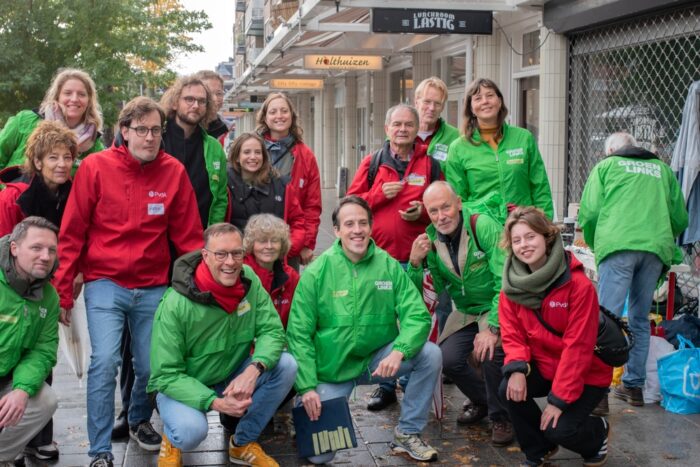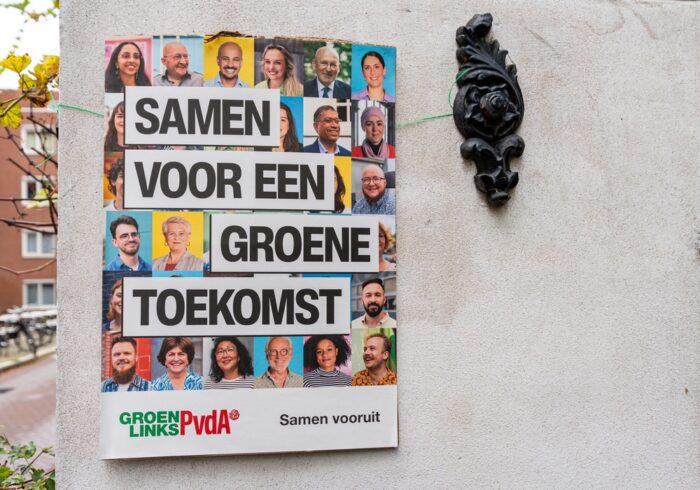Find all related Progressive Post
Progressive Post

After the elections, Germans are divided over how to deal with the radical right. Taboos have been broken, lines have been crossed. But there is hope for Progressives and democrats – if they stop trying to beat the radical right at their own game.
For eight decades, German politics has been governed by the agreement that one does not cooperate with the radical right. It was not always clear how genuine this cordon sanitaire – or Brandmauer, ‘firewall’, as the Germans call it – really was, but it held up—until now. The election is over, and the gloves are off.
When Friedrich Merz’s Christian Democratic Union (CDU) needlessly voted with the radical right Alternative for Germany (AfD) on 29 January to pass a non-binding anti-immigrant commitment in parliament, the biggest taboo in German politics was no more. The masses were outraged, hundreds of thousands went to the streets, even Angela Merkel voiced criticism. And the polls? They remained unchanged. One half of the voters looked at the other and realised: this is what they want.
Indeed, surveys showed that the electorate was split right down the middle on whether passing legislation with the AfD was acceptable. A key argument by Merz and his supporters was that the ‘right’ decision does not become wrong only because it is supported by the wrong side. Similarly, former health minister Jens Spahn previously emphasised similarities between his CDU and Trump’s US Republicans. Concerning policy substance, voters saw the CDU copy the AfD and, again, realised: this is what they want.
Importantly, it was not just the Christian Democrats. Scholz’s Social Democratic Party (SPD), the economically left-wing Bündnis Sahra Wagenknecht (BSW), the liberal Free Democratic Party (FDP), and even the Greens embraced anti-immigrant rhetoric. After this strategy failed horribly during the European elections, parties and politicians simply doubled down on it – and, as expected, failed yet again. The FDP and the BSW failed to make it into parliament. The Greens dropped below 12 per cent and Scholz’s SPD crashed and burned. Even Merz’s CDU underperformed. Previously, they proclaimed two goals: achieving an absolute majority by themselves and halving the AfD’s vote share. Instead, the CDU got their second-worst result in almost 80 years and legitimised the AfD, which doubled its vote to 20.8 per cent. Looking at these results, one wonders that this cannot be what the Christian Democrats want. Or can it?
To readers familiar with EU politics, the scenario of a German Christian Democrat normalising the radical right until it becomes a viable partner may sound familiar. It is, in a nutshell, Manfred Weber’s playbook. Tired of being tied to de facto coalitions with the centre-left, Weber has legitimised the radical right as a partner for policy coalitions step by step, thus strengthening his own negotiation power. The same has happened in Germany since Merz took over the Christian Democratic leadership. It effectively makes the CDU a pivotal party. Nobody can govern without them, but they can reach majorities with anyone they want.
Blaming the normalisation of the radical right solely on Christian Democrats is, however, far too simple. Progressives have contributed their fair share as well – and not only with their aforementioned anti-immigrant approach. In an election where Germans reported social justice as a main determinant of their vote, the centre-left largely ignored this issue. Ahead of the election, three quarters of Germans stated that opportunities in life were too dependent on family background. Similarly, two thirds agreed that it is now relatively impossible to achieve wealth through individual effort. These are bread-and-butter issues for Progressives. Against this background, the biggest comeback of the election is not that surprising: the Left Party embraced an unapologetically ‘social’ campaign in rejection of both radical right parties and policies. After dropping so low in the polls that major institutes stopped reporting their numbers, receiving almost 9 per cent of the vote seemed impossible until very late in the campaign. One can only imagine what a party with greater mainstream appeal, such as the SPD, could achieve if they were to focus on policy areas which they can actually win.
A notion that crept into public and private conversations ahead of the election was that this was merely a transition phase. What really matters is what happens in four years. The AfD is not yet sufficiently normalised to become a fully-fledged coalition partner. The most conservatives can do right now is pass policies with their informal support. However, the experience from other European democracies has shown that this slippery slope only strengthens the radical right and eventually pushes them into government. Contrary to many Germans’ long-standing self-image as being resistant to the errors of the past, the election has unveiled an inconvenient truth. Some old ideas have never left. Now, they are out in the open.
For too long, Progressives have erroneously focused on copying the AfD, alienating voters along the way. Instead, they desperately need to embrace social justice and an economy that works for everyone. This will not make the radical right disappear. After all, many voted for them not despite what they say, but because of it. A genuinely transformative social agenda may, however, be a buffer against the far right’s growing appeal beyond their core electorate – a firewall of sorts. This, then, is the key difference in philosophies that plays out now. Some believe that the AfD as such is the problem but that its proposals are reasonable. They thus want to ‘make the AfD small’ by copying it. Others believe that a problem with radical right parties consists in their policies, too. This implies standing up against their agenda and shunning cooperation. After all, 20.8 per cent for the AfD means that almost 80 per cent did not vote for them. Which philosophy represents what voters want? The future will tell – all eyes on 2029.
Photo credits: Shutterstock.com/Sybille Reuter
| Cookie | Duration | Description |
|---|---|---|
| cookielawinfo-checkbox-advertisement | 1 year | Set by the GDPR Cookie Consent plugin, this cookie is used to record the user consent for the cookies in the "Advertisement" category . |
| cookielawinfo-checkbox-analytics | 11 months | This cookie is set by GDPR Cookie Consent plugin. The cookie is used to store the user consent for the cookies in the category "Analytics". |
| cookielawinfo-checkbox-functional | 11 months | The cookie is set by GDPR cookie consent to record the user consent for the cookies in the category "Functional". |
| cookielawinfo-checkbox-necessary | 11 months | This cookie is set by GDPR Cookie Consent plugin. The cookies is used to store the user consent for the cookies in the category "Necessary". |
| cookielawinfo-checkbox-others | 11 months | This cookie is set by GDPR Cookie Consent plugin. The cookie is used to store the user consent for the cookies in the category "Other. |
| cookielawinfo-checkbox-performance | 11 months | This cookie is set by GDPR Cookie Consent plugin. The cookie is used to store the user consent for the cookies in the category "Performance". |
| csrftoken | past | This cookie is associated with Django web development platform for python. Used to help protect the website against Cross-Site Request Forgery attacks |
| JSESSIONID | session | The JSESSIONID cookie is used by New Relic to store a session identifier so that New Relic can monitor session counts for an application. |
| viewed_cookie_policy | 11 months | The cookie is set by the GDPR Cookie Consent plugin and is used to store whether or not user has consented to the use of cookies. It does not store any personal data. |
| Cookie | Duration | Description |
|---|---|---|
| __cf_bm | 30 minutes | This cookie, set by Cloudflare, is used to support Cloudflare Bot Management. |
| S | 1 hour | Used by Yahoo to provide ads, content or analytics. |
| sp_landing | 1 day | The sp_landing is set by Spotify to implement audio content from Spotify on the website and also registers information on user interaction related to the audio content. |
| sp_t | 1 year | The sp_t cookie is set by Spotify to implement audio content from Spotify on the website and also registers information on user interaction related to the audio content. |
| Cookie | Duration | Description |
|---|---|---|
| CONSENT | 2 years | YouTube sets this cookie via embedded youtube-videos and registers anonymous statistical data. |
| iutk | session | This cookie is used by Issuu analytic system to gather information regarding visitor activity on Issuu products. |
| s_vi | 2 years | An Adobe Analytics cookie that uses a unique visitor ID time/date stamp to identify a unique vistor to the website. |
| Cookie | Duration | Description |
|---|---|---|
| NID | 6 months | NID cookie, set by Google, is used for advertising purposes; to limit the number of times the user sees an ad, to mute unwanted ads, and to measure the effectiveness of ads. |
| VISITOR_INFO1_LIVE | 5 months 27 days | A cookie set by YouTube to measure bandwidth that determines whether the user gets the new or old player interface. |
| YSC | session | YSC cookie is set by Youtube and is used to track the views of embedded videos on Youtube pages. |
| yt-remote-connected-devices | never | YouTube sets this cookie to store the video preferences of the user using embedded YouTube video. |
| yt-remote-device-id | never | YouTube sets this cookie to store the video preferences of the user using embedded YouTube video. |
| yt.innertube::nextId | never | This cookie, set by YouTube, registers a unique ID to store data on what videos from YouTube the user has seen. |
| yt.innertube::requests | never | This cookie, set by YouTube, registers a unique ID to store data on what videos from YouTube the user has seen. |
| Cookie | Duration | Description |
|---|---|---|
| COMPASS | 1 hour | No description |
| ed3e2e5e5460c5b72cba896c22a5ff98 | session | No description available. |
| loglevel | never | No description available. |


